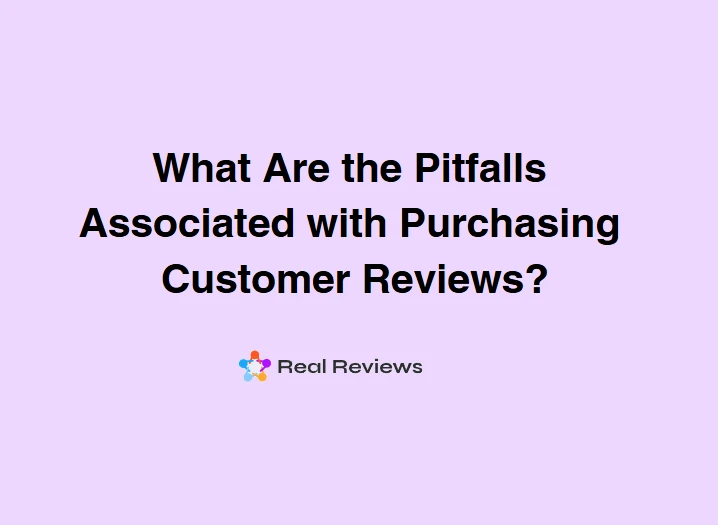
What Are the Pitfalls Associated with Purchasing Customer Reviews?
Nowadays, people use customer reviews as a primary source of information when choosing a product or service. Unsurprisingly, business owners are willing to collect as many positive reviews as possible to improve their image on the market and attract more customers. One might get lured into thinking that buying customer reviews is the way to go. However, it is a dangerous route with many negative implications and lasting effects on the business and its customers’ trust.
Fake customer reviews are not real and are usually written by individuals who have not interacted with the product or the service. These reviews are paid opinions bought from third parties for a certain amount. Even though these measures may appear as a simple solution to enhance a company’s image, they are quite dangerous.
So, business trust is paramount. Losing customer trust is one of the biggest threats organizations face. Today’s consumers are smart and can easily distinguish between genuine reviews and so-called fake ones, and they are not shy about reporting them to the relevant authorities. This, in turn, results in a loss of confidence in the reviews and the brand being reviewed. So, buying fake reviews is not what your business needs.
The next significant impact is the loss of a company’s reputation in an online environment. Internet reputation management has made it challenging for fake reviews to remain unnoticed, yet search engines and review platforms are enhancing their algorithms to identify and penalize each fake review. Any business involved in such activities will likely face penalties for lower search engine rankings account deletion, among other legal repercussions. So, a fake reputation is a bomb with a short-term timer.
BrightLocal report revealed that 82% of consumers had encountered fake reviews last year, but 62% could not easily differentiate fake reviews. This shows why one must maintain real feedback to make such parameters as customer trust on a high level. However, in the long run, the costs outdo all the possible short-term gains one might have hoped to achieve.
Why Companies Buy Reviews
Naturally, as online business becomes competitive, companies experience tremendous pressure to differentiate themselves. Some businesses may want a quick reputation boost, so they may pay for reviews to increase their rating. Positive word of mouth can enhance Customer Attraction by making a company seem more credible and well-liked. This influx of positive feedback can also assist in brand trust building since other potential customers would be more inclined to go to a business establishment surrounded by a lot of positive feedback. Customer confidence is all you need to prosper.
However, the desire to purchase reviews is wider than self-ornamental statistics. Relevant recommendations are connected with increased visibility on platforms such as Google and Yelp, where higher ratings increase the website’s rank and attract more clients. Buying reviews is a bad idea. For small or weak competitors, this can appear as a convenient way to compete with stronger and more experienced opponents. So, a reputation boost is crucial. Check these examples:
- Sunday Riley Skincare: In 2019, the skincare company Sunday Riley was exposed for encouraging its staff to write numerous fake reviews on Sephora’s website to enhance the ratings of the company’s products. The occurrence affected the company in a way that affected consumers’ trust, though earlier, they were much into the products that this company was dealing with.
- Legacy Plumbing: This Canadian plumbing company was caught over and over again using fake reviews on Google. Although they arose to increase their ratings, the removal of these reviews by Google resulted in fluctuations in the ratings of other users, which is detrimental to their reliability.
So, you need positive feedback for product promotion. You should organically increase the number of positive comments rather than trying to falsify them. In the medium term, your business visibility will increase. If you manipulate the crowd's opinion, you risk facing a fiasco.
Technical and Legal Consequences of Buying Reviews
The problem with buying fake reviews is that it entails a lot of technical and legal dangers. Google Review Policies do not allow fake reviews and use sophisticated spam filters to detect fake reviews. Such algorithms detect the reviews and activity of the reviewers. The language used to determine the probable fake reviews. After they are identified, they are deleted, and the business's rating can drastically drop, thus negatively impacting its online presence.
So, how much of a fine might businesses pay if they’re caught buying or selling fake reviews? From a legal perspective, companies paying for the reviews will likely suffer from regulators like the Federal Trade Commission (FTC). For instance, the FTC is empowered to fine the involved companies and other entities heavily, besides ordering them to cease the deceptive practices. For example, Sunday Riley Skincare was involved in a legal battle for paid employees to write fake reviews for their products; therefore, the firm had to pay the FTC in a settlement.
To prevent such fake reputation outcomes, companies should pay attention to the positive changes in reputation based on customer interaction and follow legal requirements. Intending to provide genuine feedback, replying to negative messages constructively, and responding to customers’ feedback are some of the best ways of building trust and credibility without using unethical means. So, buying reviews is a big no-no!
Impact on Customer Trust
This is a clear indication that purchasing fake reviews will have a very negative effect on Customer Trust, which is very important for every company. This is because when the customers realize a company has ripped them off, they no longer trust the brand but view it as a rip-off artist, thus incurring serious reputation damage. The consumer trust is a valuable asset!
Another factor that has grown more challenging in the modern world is review authenticity, where customers are getting smarter daily. They search for these patterns, like using exaggerated and positive language, many similar reviews within a short time, or reviews made by users who have never reviewed any product. You should check examples before ruining your brand reputation by creating fake testimonials.
- Café Roma: Last year, this New York café was caught red-handed buying fake Yelp reviews to enhance its rating. After the rumors spread, people refused to patronize the café, and the café's business drastically declined.
- VIP Deals: An Amazon seller was criticized for offering buyers refunds in exchange for positive feedback. Having been exposed, the company lost its reputation, making it hard for customers to trust it, drastically reducing sales.
These examples show the different long-term effects of paying for fake reviews, and the key message is that once trust is broken, it is extremely hard to rebuild. Organizations should work towards increasing organic customers’ feedback instead of indulging in manipulative strategies that can ruin the company’s reputation. So, reputational harm is not what you need!
Impact on SEO and Online Visibility
Purchasing fake reviews harms a business's physical and online identity by worsening its SEO penalties. As one of the most widely used search engines, Google has a policy against fake reviews, and penalties for policy violations may be severe. Some of the SEO penalties that may occur are the deletion of fake reviews, reduction in the ranking position of the business, or even complete banning of the business from the search list. This is not good for businesses as people need help finding them through a search engine or social media platforms.
A website's position in the search engines is vital to the success of an online business. This helps achieve a high ranking in search engines, improving visibility, hence more traffic and, by extension, more customers. However, when a business pays for fake reviews, it will likely trigger Google’s Spam Detection Algorithms. These algorithms are meant to identify spam, and once spam is found, it can greatly reduce the position of a website or blog. This drop affects organic traffic, which refers to the visitors that go to a particular website due to the unpaid search engine.
So, learn what Google penalties are nowadays. Reducing organic traffic is dangerous for businesses because it indicates losing their potential customers. BrightLocal also reveals that 91% of consumers rely on positive reviews when selecting a business, thus underlining the need to retain natural feedback. Indeed, when fake reviews are identified, the business loses its position and the credibility of all the reviews the company wrote.
Although paying for fake reviews can bring certain benefits in the short term, this enticing leads to the following negative effects: the website drops in the search engine rankings, organic traffic decreases, and the brand's online reputation is harmed. This shows a need to establish a reputable and reliable review profile from genuine customer relations. Keep your website visibility high!
Alternatives to Buying Fake Reviews
Creating a true review profile for long-term sustainable business is crucial. There are genuine and ethical ways to persuade customers to write their feedback other than fake reviews. It will also be important to note that customer incentives are useful for reviews. Customers may be willing to share their experiences to get a discount, a freebie, or a chance to win a prize. However, ensuring that these incentives are not against the platforms' rules is crucial, as many platforms do not allow payment for positive reviews. However, this should be done to encourage people to give feedback, especially negative feedback. Use reward for review model!
Another element of the loyalty programs is that they stimulate the generation of reviews. This way, businesses create a sense of community and encourage people to return for more purchases by offering them points, discounts, or special offers. Thus, fully satisfied customers will give positive feedback independently without persuasion. Review solicitation is paramount! These programs do not only serve as ways to retain customers but also as a means to obtain real feedback.
Review solicitation is another good way to do it. This entails going directly to the customers and appealing to them to write the reviews. Within a week of a customer’s purchase or use of a service, use an email or text message to thank the customer and ask for feedback. Minimize the process as much as possible by offering readers links to the review platforms. These requests can be made more personalized, improving the chances of a response being given. For instance, referring to certain details of the customer purchase or service would make the solicitation seem more realistic. Check these recommendations to enjoy all review benefits in no time:
- Ensure your employees understand customer service's importance.
- Use CRM tools to automate review requests after a purchase.
- Actively monitor reviews and respond to them, whether positive or negative.
Employ all review request email patterns. Follow the above tips and, you will be able to neutralize the influence of negative reviews. Do not try to boost your reputation with hundreds of similar, generic comments. This is not what will make your sales big.
Conclusion
Consumer trust is all you need! Even though this may seem like an appealing solution to gain a few extra positive reviews, the dangers are much greater. Fake reviews may result in such serious outcomes as SEO penalties, customer distrust, and a long-term negative impact on your business’s reputation. To this end, businesses should embrace genuine reviews, proper business practices, and sincere efforts to manage their reputation.
Real reviews and comment management procedures should be employed to establish long-lasting and effective credibility in the market as well as customer attraction. To begin with, there is a need to increase the authenticity of the review strategies used to achieve your goals today. Make your brand reputation solid!
05.02.2025




